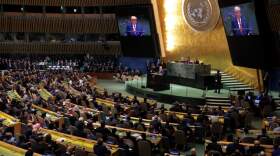A MARTÍNEZ, HOST:
We have the music of the Democratic Convention, where delegates voted in a symbolic roll call.
(SOUNDBITE OF ARCHIVED RECORDING)
UNIDENTIFIED PRESENTER: Georgia, how do you cast your vote?
(SOUNDBITE OF MUSIC)
LIL JON: Yeah. Ladies and gentlemen, we are here today to officially nominate Kamala Harris for President.
(Rapping) Fire up that loud, another round of shots. DNC. Turn down for what?
MARTÍNEZ: Rapper Lil Jon announced Georgia's vote as a DJ played different music to represent each state, and Second Gentleman Doug Emhoff shared a memory. He talked about how he first spoke on the phone with Kamala Harris before a blind date.
(SOUNDBITE OF ARCHIVED RECORDING)
DOUG EMHOFF: And we talked for an hour, and we laughed. Well, you know that laugh. I love that laugh.
(CHEERING)
STEVE INSKEEP, HOST:
Which Republicans have criticized, while Democrats have embraced. Now, as Democrats speak in Chicago, a lot of ads are playing in swing states, where both candidates have also been traveling. Much of the focus is on the Blue Wall. These are states that historically vote Democratic in presidential elections. In 2016, three states of that wall fell. Michigan, Pennsylvania and Wisconsin all voted for Donald Trump. The term Blue Wall was coined by Ron Brownstein, a senior editor at The Atlantic. He says voters in those three states are a little bit older and whiter than in others.
RON BROWNSTEIN: The Blue Wall states tend to be college-educated, diverse, culturally moderate to liberal, with, as I wrote then, below-average rates of church attendance and fewer evangelical Protestants, but Michigan, Pennsylvania and Wisconsin - Democrats there relied on what I've called an act of political levitation, right? Historically, they run just a little bit better among working-class, white voters in those states than they do elsewhere. Trump exploited that vulnerability.
INSKEEP: So Trump pulled them away. They came back in 2020, and up until the switch in Democratic candidates, it looked like Joe Biden was on track to lose those three states.
BROWNSTEIN: Well, they were his only pathway to 270, but even for her, there's no question that the shortest pathway to 270 is still sweeping Michigan, Pennsylvania, Wisconsin, plus that one congressional district.
INSKEEP: I'm looking at this electoral map and realizing that even among those three, Pennsylvania is the hardest to replace. If you lose Wisconsin...
BROWNSTEIN: Yes.
INSKEEP: ...You can find another state like Arizona, with about the same electoral votes. Nothing replaces Pennsylvania and its 19 votes.
BROWNSTEIN: Right. If you lose Pennsylvania, you have to win one of the Southeast battlegrounds and one of the Southwest battlegrounds, but here's something worth keeping in mind. In every election since 1980 except one, these three states - Michigan, Pennsylvania and Wisconsin - have voted the same way. I increasingly kind of look at these states almost as one entity. One Democratic strategist described them to me this week as Mipawi, right?
INSKEEP: (Laughter).
BROWNSTEIN: I mean, Michigan, Pennsylvania and Wisconsin - they are now the largest swing state.
INSKEEP: Biden could make a case back in 2020 that he was a good fit for these crucial states. He had a personal connection to Pennsylvania. He had a kind of working-class background himself. Nevertheless, he was losing. Kamala Harris has now pulled ahead, for the moment. How, if at all, does she and her politics fit with these states?
BROWNSTEIN: In those three states, really, the critical test for her is can she hold Biden's support among non-college and older whites, who are a bigger percentage of the vote there than they are almost anywhere else? Those voters are the absolute principal audience for the Republican argument that she is soft on crime, soft on immigration. She's not going to keep you safe. If they can peel away blue-collar and older white voters with those arguments, you can see a pathway for Trump to squeeze out a 2016-style victory in at least one of those states, and maybe more of them. I think it's really significant that in the initial polling, they have not run for the exits, which says to me that the share of those voters who will not accept a Black woman as president isn't really much different than the share who won't accept any Democrat.
INSKEEP: This analysis informs a story that I experienced recently a few weeks ago, right after Harris became the Democratic candidate. I was talking with voters in Pennsylvania, and in Moon Township, outside of Pittsburgh, I sat in a Primanti's sandwich shop with a Democratic activist, and she said any Democratic candidate has to make people feel safe, and she was personally excited about Harris because of her background as a prosecutor. A few weeks later, Harris stopped at the literal same Primanti's...
BROWNSTEIN: Wow.
INSKEEP: ...Sandwich shop to appeal to voters, so that would seem to be the kind of anecdote that's driving what you're saying here.
BROWNSTEIN: A lot of people are talking about how they expect the Republican campaign to echo the famous Willie Horton argument against Michael Dukakis in 1988, when Republicans seized on a murderer who was allowed out on the Massachusetts furlough program and committed another crime. The difference is Dukakis, as a governor, could not talk about other people that he put in jail. The idea that Kamala is a cop, which was a negative for her when she was running for the Democratic nomination, may be the thin line of defense that allows her to hold enough of these working-class voters in those three states to get over the top.
INSKEEP: Ron Brownstein of The Atlantic. Always a pleasure talking with you.
BROWNSTEIN: Steve, thanks for having me. Transcript provided by NPR, Copyright NPR.
NPR transcripts are created on a rush deadline by an NPR contractor. This text may not be in its final form and may be updated or revised in the future. Accuracy and availability may vary. The authoritative record of NPR’s programming is the audio record.




